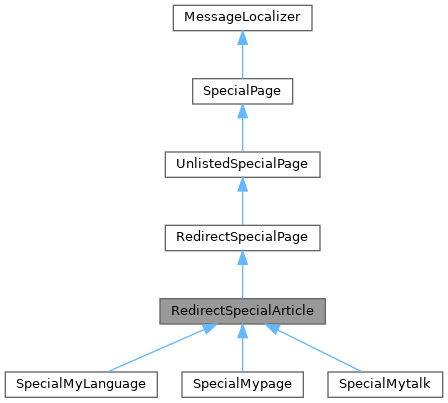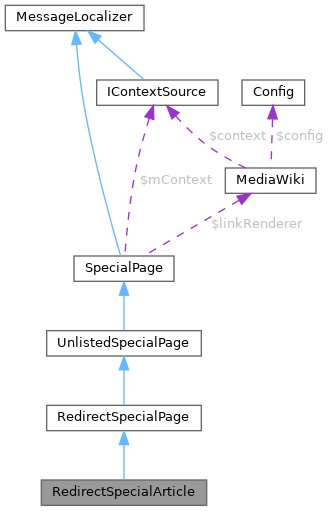RedirectSpecialArticle Class Reference
Superclass for any RedirectSpecialPage which redirects the user to a particular article (as opposed to user contributions, logs, etc.). More...
Inheritance diagram for RedirectSpecialArticle:

Collaboration diagram for RedirectSpecialArticle:

Public Member Functions | |
| __construct ( $name) | |
 Public Member Functions inherited from RedirectSpecialPage Public Member Functions inherited from RedirectSpecialPage | |
| execute ( $subpage) | |
| getRedirect ( $subpage) | |
| If the special page is a redirect, then get the Title object it redirects to. | |
| getRedirectQuery () | |
| Return part of the request string for a special redirect page This allows passing, e.g. | |
| personallyIdentifiableTarget () | |
| Indicate if the target of this redirect can be used to identify a particular user of this wiki (e.g., if the redirect is to the user page of a User). | |
 Public Member Functions inherited from UnlistedSpecialPage Public Member Functions inherited from UnlistedSpecialPage | |
| __construct ( $name, $restriction='', $function=false, $file='default') | |
| isListed () | |
| Whether this special page is listed in Special:SpecialPages. | |
 Public Member Functions inherited from SpecialPage Public Member Functions inherited from SpecialPage | |
| __construct ( $name='', $restriction='', $listed=true, $function=false, $file='', $includable=false) | |
| Default constructor for special pages Derivative classes should call this from their constructor Note that if the user does not have the required level, an error message will be displayed by the default execute() method, without the global function ever being called. | |
| addHelpLink ( $to, $overrideBaseUrl=false) | |
| Adds help link with an icon via page indicators. | |
| checkPermissions () | |
| Checks if userCanExecute, and if not throws a PermissionsError. | |
| checkReadOnly () | |
| If the wiki is currently in readonly mode, throws a ReadOnlyError. | |
| displayRestrictionError () | |
| Output an error message telling the user what access level they have to have. | |
| doesWrites () | |
| Indicates whether this special page may perform database writes. | |
| getConfig () | |
| Shortcut to get main config object. | |
| getContext () | |
| Gets the context this SpecialPage is executed in. | |
| getDescription () | |
| Returns the name that goes in the \<h1\> in the special page itself, and also the name that will be listed in Special:Specialpages. | |
| getFinalGroupName () | |
| Get the group that the special page belongs in on Special:SpecialPage Use this method, instead of getGroupName to allow customization of the group name from the wiki side. | |
| getFullTitle () | |
| Return the full title, including $par. | |
| getLanguage () | |
| Shortcut to get user's language. | |
| getLinkRenderer () | |
| getLocalName () | |
| Get the localised name of the special page. | |
| getName () | |
| Get the name of this Special Page. | |
| getOutput () | |
| Get the OutputPage being used for this instance. | |
| getPageTitle ( $subpage=false) | |
| Get a self-referential title object. | |
| getRequest () | |
| Get the WebRequest being used for this instance. | |
| getRestriction () | |
| Get the permission that a user must have to execute this page. | |
| getSkin () | |
| Shortcut to get the skin being used for this instance. | |
| getTitle ( $subpage=false) | |
| Get a self-referential title object. | |
| getUser () | |
| Shortcut to get the User executing this instance. | |
| including ( $x=null) | |
| Whether the special page is being evaluated via transclusion. | |
| isCached () | |
| Is this page cached? Expensive pages are cached or disabled in miser mode. | |
| isExpensive () | |
| Is this page expensive (for some definition of expensive)? Expensive pages are disabled or cached in miser mode. | |
| isIncludable () | |
| Whether it's allowed to transclude the special page via {{Special:Foo/params}}. | |
| isRestricted () | |
| Can be overridden by subclasses with more complicated permissions schemes. | |
| listed ( $x=null) | |
| Get or set whether this special page is listed in Special:SpecialPages. | |
| maxIncludeCacheTime () | |
| How long to cache page when it is being included. | |
| msg ( $key) | |
| Wrapper around wfMessage that sets the current context. | |
| outputHeader ( $summaryMessageKey='') | |
| Outputs a summary message on top of special pages Per default the message key is the canonical name of the special page May be overridden, i.e. | |
| prefixSearchSubpages ( $search, $limit, $offset) | |
| Return an array of subpages beginning with $search that this special page will accept. | |
| requireLogin ( $reasonMsg='exception-nologin-text', $titleMsg='exception-nologin') | |
| If the user is not logged in, throws UserNotLoggedIn error. | |
| run ( $subPage) | |
| Entry point. | |
| setContext ( $context) | |
| Sets the context this SpecialPage is executed in. | |
| setHeaders () | |
| Sets headers - this should be called from the execute() method of all derived classes! | |
| setLinkRenderer (LinkRenderer $linkRenderer) | |
| setListed ( $listed) | |
| Set whether this page is listed in Special:Specialpages, at run-time. | |
| userCanExecute (User $user) | |
| Checks if the given user (identified by an object) can execute this special page (as defined by $mRestriction). | |
Additional Inherited Members | |
 Static Public Member Functions inherited from SpecialPage Static Public Member Functions inherited from SpecialPage | |
| static | getSafeTitleFor ( $name, $subpage=false) |
| Get a localised Title object for a page name with a possibly unvalidated subpage. | |
| static | getTitleFor ( $name, $subpage=false, $fragment='') |
| Get a localised Title object for a specified special page name If you don't need a full Title object, consider using TitleValue through getTitleValueFor() below. | |
| static | getTitleValueFor ( $name, $subpage=false, $fragment='') |
| Get a localised TitleValue object for a specified special page name. | |
 Protected Member Functions inherited from RedirectSpecialPage Protected Member Functions inherited from RedirectSpecialPage | |
| showNoRedirectPage () | |
 Protected Member Functions inherited from SpecialPage Protected Member Functions inherited from SpecialPage | |
| addFeedLinks ( $params) | |
| Adds RSS/atom links. | |
| afterExecute ( $subPage) | |
| Gets called after. | |
| beforeExecute ( $subPage) | |
| Gets called before. | |
| checkLoginSecurityLevel ( $level=null) | |
| Verifies that the user meets the security level, possibly reauthenticating them in the process. | |
| getCacheTTL () | |
| getGroupName () | |
| Under which header this special page is listed in Special:SpecialPages See messages 'specialpages-group-*' for valid names This method defaults to group 'other'. | |
| getLoginSecurityLevel () | |
| Tells if the special page does something security-sensitive and needs extra defense against a stolen account (e.g. | |
| getRobotPolicy () | |
| Return the robot policy. | |
| getSubpagesForPrefixSearch () | |
| Return an array of subpages that this special page will accept for prefix searches. | |
| prefixSearchString ( $search, $limit, $offset) | |
| Perform a regular substring search for prefixSearchSubpages. | |
| setReauthPostData (array $data) | |
| Record preserved POST data after a reauthentication. | |
| useTransactionalTimeLimit () | |
| Call wfTransactionalTimeLimit() if this request was POSTed. | |
 Static Protected Member Functions inherited from SpecialPage Static Protected Member Functions inherited from SpecialPage | |
| static | prefixSearchArray ( $search, $limit, array $subpages, $offset) |
| Helper function for implementations of prefixSearchSubpages() that filter the values in memory (as opposed to making a query). | |
 Protected Attributes inherited from RedirectSpecialPage Protected Attributes inherited from RedirectSpecialPage | |
| $mAddedRedirectParams = [] | |
| $mAllowedRedirectParams = [] | |
 Protected Attributes inherited from SpecialPage Protected Attributes inherited from SpecialPage | |
| IContextSource | $mContext |
| Current request context. | |
| $mIncludable | |
| $mIncluding | |
| $mName | |
| $mRestriction | |
Detailed Description
Superclass for any RedirectSpecialPage which redirects the user to a particular article (as opposed to user contributions, logs, etc.).
For security reasons these special pages are restricted to pass on the following subset of GET parameters to the target page while removing all others:
- useskin, uselang, printable: to alter the appearance of the resulting page
- redirect: allows viewing one's user page or talk page even if it is a redirect.
- rdfrom: allows redirecting to one's user page or talk page from an external wiki with the "Redirect from..." notice.
- limit, offset: Useful for linking to history of one's own user page or user talk page. For example, this would be a link to "the last edit to your user talk page in the year 2010": https://en.wikipedia.org/wiki/Special:MyPage?offset=20110000000000&limit=1&action=history
- feed: would allow linking to the current user's RSS feed for their user talk page: https://en.wikipedia.org/w/index.php?title=Special:MyTalk&action=history&feed=rss
- preloadtitle: Can be used to provide a default section title for a preloaded new comment on one's own talk page.
- summary : Can be used to provide a default edit summary for a preloaded edit to one's own user page or talk page.
- preview: Allows showing/hiding preview on first edit regardless of user preference, useful for preloaded edits where you know preview wouldn't be useful.
- redlink: Affects the message the user sees if their talk page/user talk page does not currently exist. Avoids confusion for newbies with no user pages over why they got a "permission error" following this link: https://en.wikipedia.org/w/index.php?title=Special:MyPage&redlink=1
- debug: determines whether the debug parameter is passed to load.php, which disables reformatting and allows scripts to be debugged. Useful when debugging scripts that manipulate one's own user page or talk page.
- Hook extension:
- Extensions can add to the redirect parameters list by using the hook RedirectSpecialArticleRedirectParams
This hook allows extensions which add GET parameters like FlaggedRevs to retain those parameters when redirecting using special pages.
- Hook extension example:
- $wgHooks['RedirectSpecialArticleRedirectParams'][] ='MyExtensionHooks::onRedirectSpecialArticleRedirectParams';public static function onRedirectSpecialArticleRedirectParams( &$redirectParams ) {$redirectParams[] = 'stable';return true;}
Definition at line 213 of file RedirectSpecialPage.php.
Constructor & Destructor Documentation
◆ __construct()
| RedirectSpecialArticle::__construct | ( | $name | ) |
Definition at line 214 of file RedirectSpecialPage.php.
The documentation for this class was generated from the following file:
- includes/specialpage/RedirectSpecialPage.php